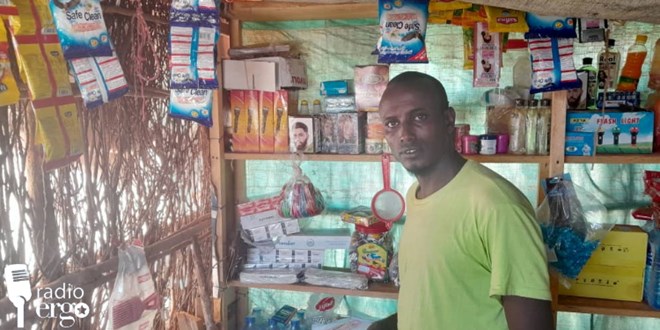
Thursday April 20, 2023

Former pastoralist Shire in his shop in El-jalle camp/Ahmad Toronto/Ergo
Shire Mohamud Hassan, 32, a former pastoralist who lost all his livestock to the drought a year ago, has turned successfully to retail business to provide for his family.
He now runs a small stall at his house in El-jale 2 IDP camp on the outskirts of Kismayo in southern Somalia’s Lower Juba, selling a variety of goods and providing a solar-powered phone charging service.
With no livestock or money to start his business, he took a loan from a storekeeper who used to sell him livestock feed.
“I wasn’t a businessman, I was a herdsman keeping cows,” he said. “I had no other help so I decided to contact a good friend and explain my situation and ask for capital.”
He started his business last August with a $320 loan, paid it off in two months, and then took another $500 loan. He makes $13-$15 a day from the shop and manages to save some money after paying for the family’s needs.
“I am able to find money to buy medicine for someone who’s sick. If we run out of firewood, I can buy it. In terms of food, we are better off. In a day, my family might spend $2 or $3 or even up to $4. I pay for our food from the shop,” he said.
Shire enrolled his three children, two boys and a girl, in school for the first time in January in the camp. Tuition is free and he was able to afford $30 to buy them the educational materials.
Abdikhayr Abdi Yusuf is the friendly businessman who has been supporting Shire’s transition from livestock husbandry to business. He said Shire is reliable and he was confident about lending him money.
“I trust him because he is a very hard working and active man. I gave him a little at first, then I continued. He paid back everything and then took another loan. As of now he owes me $187 according to my records. I believe he is a progressive young man with a family,” he said.
Shire and Abdikhayr have been transacting with each for the past 10 years. They met in Kismayo while Shire was selling off some of his livestock.
Shire’s business started from a roadside table. The camp has no marketplace, so he built a structure made of iron-sheets and wood. At first there were problems because it had no door.
“Several times when I went to prayers, I found things missing because there was no door. Items stacked up like perfumes and shampoos could drop and be picked up by children. I decided to make a door!” he said.
Shire and his family migrated from the rural areas of Qooqani village in Lower Juba, after losing 80 cows. He arrived in the internal displacement camp with nine cows but the last one died in October.
He estimates his business is now worth $1,500 and thinks more pastoralists who lost their livestock could set up businesses instead of depending on aid or odd jobs.
“I want my business to become a company and employ many different people facing difficult situations just like myself. I would like the company to be dependable and offer employment opportunities,” he said.
Most of the others running businesses in El-jale 2 camp had business experience before becoming displaced by conflict.